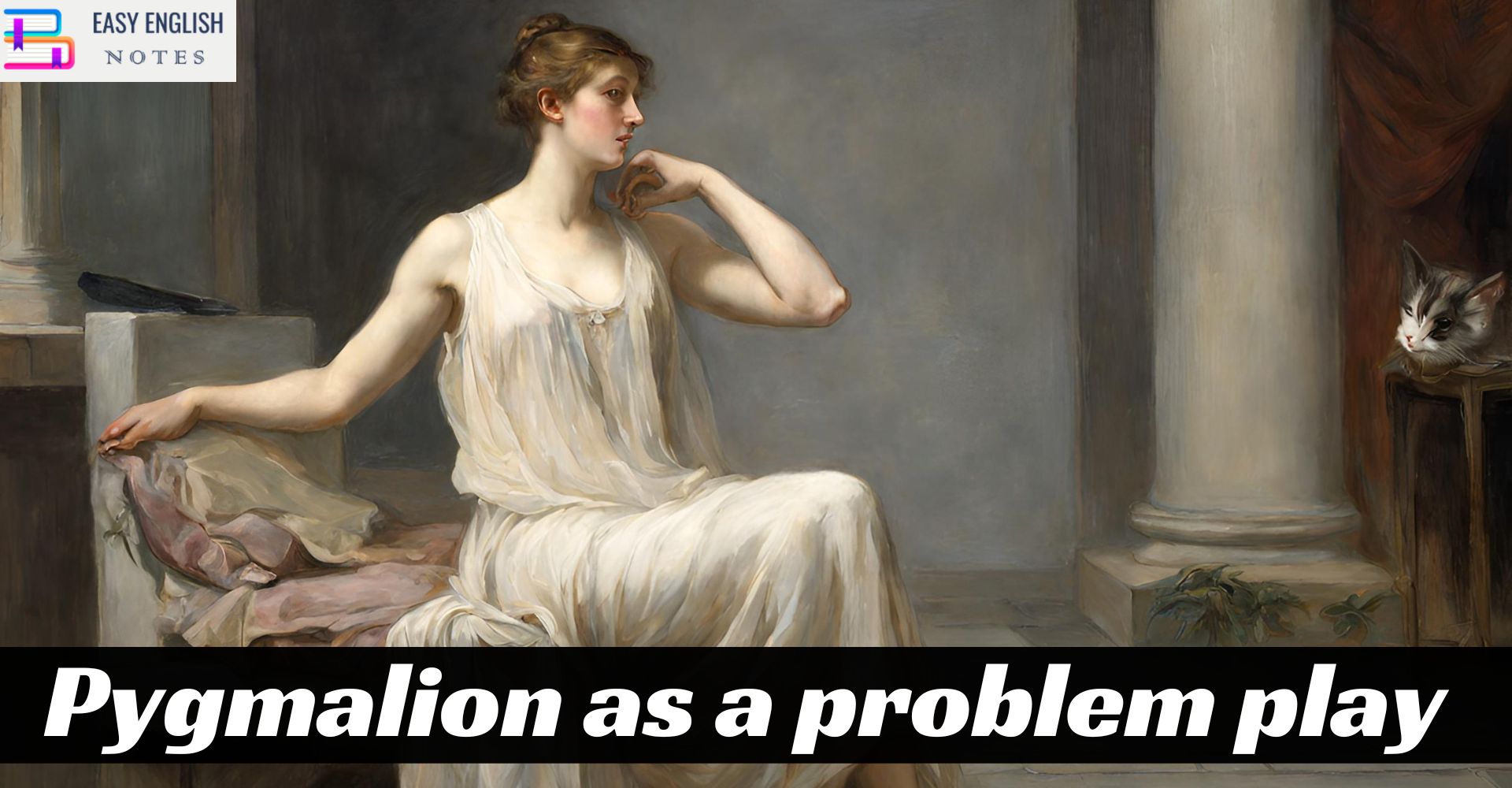Bernard Shaw was a great dramatic genius of the modern world. He was mainly a writer of problem plays. His plays are the dramatisations of certain social questions which have an important bearing upon the life of the community consequently, the tend to be topical but their topicality which makes for immediate appeal must be given a larger significance and applicability to attain the status of art. Problem plays are by their very nature critical and social in import. Shaw makes an attempt in his plays to achieve a synthesis between comedy and criticism to make comedy critical and to sing criticism with comedy. Pygmalion deals with the world-wide problem of education. The purpose of education is to make one fit in a civilized and cultured society. To educate means to give new life to those who receive the education. New life produces discontent with existing circumstances and creates the desire for a different kind of world.
The world-problem of education is presented in Pygmalion through the medium of a lesser theme which is a national one. It is confined to the English who according to Shaw “have no respect for their language, and will not teach their children to speak it.” As an Irishman with a sensitive ear which had been trained to value musical sounds, and with a naturally beautiful speaking voice of his own, Bernard Shaw was disgusted with the harsh and slovenly speech of many people in England. He blamed this to English spelling and he left most of his large fortune to pay the expenses of starting a new English alphabet based on phonetic principles which would provide a separate symbol or sign for each spoken sound, thus enlarging the alphabet considerably. Shaw believed that this exact representation of sounds would bring about correct pronunciation by everyone. It will break down class-distinctions for the English people are very sensitive to the way others speak, and are inclined to despite those who talk differently from themselves. An aristocrat in the West End of London may think an East-End Londoner ignorant and low-class because his accent is different. The East-End Londoner may laugh at and mock the West-End Londoner’s accent because to him it sounds unnatural and conceited.
There has never been a nation-wide acceptance of a single standard of English accent and pronunciation. Not only to differently educated people talks differently, but there are also variation from region to region throughout England. There have been differences between Northern countries and Western, between Eastern and Southern and so on. Radio broadcasting has encouraged a “standard pronunciation, but no native of Lancashire Devon of suffolls, or of most other English countries, would wish to make the same sounds as a B.B.C. London, announcer. Although Shaw complained about, English, pronunciation generally, his particular Quarrel was with “cockney, a rather vague word used to denote a London dialect, of which Eliza Doolittle’s is an example.
Also Read :
- Compare Hamlet with Macbeth, Othello and other Tragedies
- “The Pardoner’s Tale” is the finest tale of Chaucer
- Prologue to Canterbury Tales – (Short Ques & Ans)
- Confessional Poetry – Definition & meaning
- Line By Line Explanation Of The Poem The Eve of St. Agnes
Mr. Higgins in Pygmalion is a professor of phonetics and Mr. Pickering is an expert of oriental languages. Both these gentlemen are waiting under the portico of St. Paul’s Church in order to protect themselves from torrential rain. In the meantime a flower girl arrives there with a basket of flower. She speaks in a cockney language. To Mr. Higgins her manner of speech is disgusting. He is of the view that people with bad pronunciation has no right to live. He decides to teach phonetics to the flower girl so that she may qualify for the job of lady’s maid shop assistant. The name of the flower girl is Eliza Doolittle. She comes into the language laboratory of Mr. Higgins and starts taking lessons in phonetics. Now she becomes a very smart and cultured lady. From her manner of speech and get-up, she looks like a Duchess.
When experiment is over, Mr. Higgins has a profound sense of relief and joy that he has achieved his triumph and won his bet. Even now the sentiment of Eliza is of no account. She naturally protests against this dehumanized relationship between her and her teacher. She hurls the professor’s slippers at him when he wants them, and then leaves his place, a free woman. Evidently, she has begun to feel for the professor and wants also to be felt for. In the last Act, the girl says that she would not marry him even if he proposed to her. The professor himself is curiously insensitive to sexual emotions. He does not love young women because he finds in them poor rivals to his own mother. Old Mrs. Higgins, who knows much about women, says that it would have been alright, if he had thanked her, petted her, and told her how splendid she had been. Every girl has a right to be loved and Eliza loves and is loved by Freddy Hill whom she marries. Professor Higgins remains as ever, and old bachelor. Thus, the above study of Pygmalion that shows it is a problem play par excellence.












